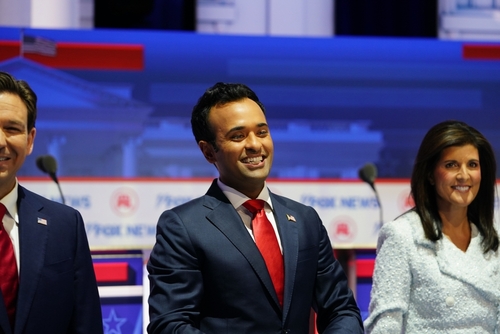
As the political landscape heats up in anticipation of the November presidential election, Governor Ron DeSantis has made a bold prediction that could shape the course of the campaigns. According to DeSantis, there will be no further debates leading up to the election, a statement that underscores the shifting dynamics of political discourse in America.
DeSantis’s assertion comes after a series of events that led to the cancellation of planned debates in New Hampshire. Both ABC News and CNN were compelled to call off their respective debates when candidates, including Nikki Haley and former President Donald Trump, declined to participate. This development has sparked conversations about the role and relevance of debates in today’s political climate.
Trump called the debate between DeSantis and Haley “two people screaming at each other” 😭😂 pic.twitter.com/xkAQLX0qGg
— Julia 🇺🇸 (@Jules31415) January 14, 2024
The decision to forego additional debates may be seen as a strategic move by DeSantis. In an era where media coverage and social platforms can amplify a candidate’s message without the traditional debate format, some argue that debates have become less critical to a campaign’s success. This perspective suggests that candidates can engage with voters directly, bypassing the potential pitfalls of live debates.
Critics of the decision might claim that avoiding debates is a disservice to the electorate, who deserve to see candidates challenged on their policies and positions. However, supporters of DeSantis might counter that the governor’s track record and public statements provide ample insight into his platform and leadership style, rendering additional debates unnecessary.
Since Nikki Haley is refusing to debate Ron DeSantis before NH, I present to you Nikki Haley debating herself pic.twitter.com/rEpO1XRZbf
— MAGA Elvis 🇺🇸 (@BenStanton77) January 19, 2024
The absence of debates could also signal a broader trend in conservative politics, where candidates focus on grassroots engagement and direct communication with their base. This approach prioritizes rallies, town halls, and social media outreach over the conventional debate stage, potentially fostering a more intimate connection with voters.
Furthermore, the decision to sidestep debates may reflect a confidence within the DeSantis camp about their standing with the electorate. By maintaining a strong presence on the campaign trail and through other forms of media, the campaign may believe that their message is already resonating with voters without the need for further debate appearances.
As the election draws closer, it remains to be seen how this strategy will impact the DeSantis campaign and the broader political discourse. With or without debates, the race for the presidency is heating up, and candidates like DeSantis are charting their own paths to potential victory.
In conclusion, Governor Ron DeSantis’s prediction of no more debates before the November election marks a significant moment in the 2024 presidential race. It reflects a calculated approach to campaigning that may redefine how candidates connect with voters in the modern era. Whether this strategy will prove successful is a question that only time—and the voters—will answer.









